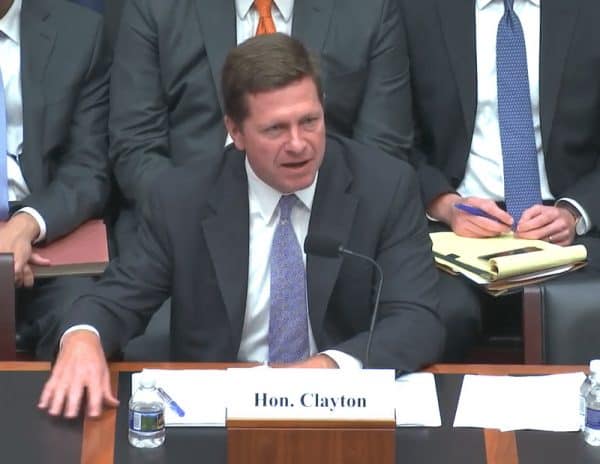
Securities and Exchange Commission Chairman Jay Clayton spent much of today visiting with the House Financial Services Committee. This was his first hearing before the Committee since he took the helm of the regulatory agency.
Much of Clayton’s prepared remarks echoed his visit to the Senate Banking Committee the previous week. But the audience was more receptive to his concerns regarding the economy, access to capital and the decline in public companies.
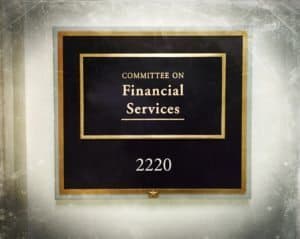 Clayton did get quizzed pointedly on the recently revealed security breach regarding EDGAR. Several Representatives inquired about the state of Cybersecurity at the SEC. With the recent revelations of “Hack a Mole” and the breaches at Equifax and the Yahoo update, identity theft and cyber attacks were clearly top of mind.
Clayton did get quizzed pointedly on the recently revealed security breach regarding EDGAR. Several Representatives inquired about the state of Cybersecurity at the SEC. With the recent revelations of “Hack a Mole” and the breaches at Equifax and the Yahoo update, identity theft and cyber attacks were clearly top of mind.
But what did Chair Clayton say about facilitating capital formation? Clayton believes that a one size regulatory structure does not fit all. The past approach of broad sweeping rules designed to target the biggest firms too frequently have harmed the small and medium sized companies. And unnecessarily so.
“I view Mr. and Ms. 401(k) as bearing a potentially significant cost as a result of the shrinking number of public companies. I expect this dynamic, if not addressed, will lead to fewer opportunities for Main Street investors to invest directly in high quality companies,” stated Chair Clayton. “To be clear, it is not fewer opportunities to invest in IPOs themselves that troubles me. But without IPOs of growing companies, we have a shrinking and generally more mature portfolio of public companies. This is a significant concern. A shrinking proportion of public companies, particularly smaller and medium-sized companies, has costs beyond investment choices, including that there will be less publicly available information about the operations and performance of companies that are important to our economy.”
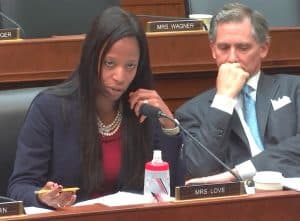 Chair Clayton highlighted the benefits of the JOBS Act of 2012, the bipartisan legislation that created three different crowdfunding exemptions, and other rules that enabled more companies to tap the public and private markets.
Chair Clayton highlighted the benefits of the JOBS Act of 2012, the bipartisan legislation that created three different crowdfunding exemptions, and other rules that enabled more companies to tap the public and private markets.
“[With] the Jumpstart Our Business Startups (JOBS) Act, there is an ecosystem displaying that a scaled disclosure and regulatory system provides incentives for companies to conduct public offerings while maintaining the world’s most robust investor protections. To be clear, this does not mean that we would sacrifice or limit the core principles of our public disclosure regime and other essential investor protections for the sake of accelerating public issuances.”
During the Q&A portion of the hearing when individual members could query the Chair, several interesting topics of discussion came up.
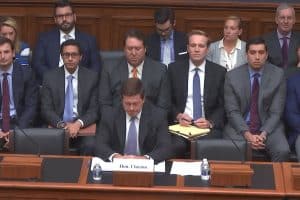 Chair Clayton was asked if he believed the definition of an Accredited Investors should be expanded. He agreed that this needed to occur. He called the current definition “binary” in an apparent reference to its blunt application that does not recognize sophistication and equates a large bank account with intellectual horsepower and investment acumen.
Chair Clayton was asked if he believed the definition of an Accredited Investors should be expanded. He agreed that this needed to occur. He called the current definition “binary” in an apparent reference to its blunt application that does not recognize sophistication and equates a large bank account with intellectual horsepower and investment acumen.
Asked about his thoughts on Initial Coin Offerings (ICOs) – a very hot topic, Clayton’s response was interesting. He described ICOs as a new avenue for fraud and expressed his concern that the good could be lost if things go wrong. If people are not better educated to the risk it will be a lot harder for the market to potentially benefit from this new tech.
Congressman Patrick McHenry pursued the ICO question while complimenting the SEC on their initial steps to regulate the sector. McHenry clearly wants to eliminate bad actors but maintain ICOs as a legitimate sector of finance. He asked Clayton to walk him through the decision making in entering into this new space for the SEC.
Clayton said they decided against starting with enforcement actions we decided with “level setting” with the ICO report.
“Here is how to behave well. And here are some things that trouble us,” said Clayton. “That was the intent of that … to notify people in this space there is a way to do this right and there are some things that trouble us. If you do it right, we are all for it. If you do it wrong, you are going to have some explaining to do.”
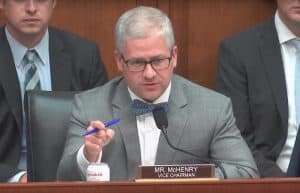 McHenry followed with a question as to what the SEC is doing to make certain entrepreneurs are following ICOs correctly.
McHenry followed with a question as to what the SEC is doing to make certain entrepreneurs are following ICOs correctly.
“First ask yourself if it is a security. In most cases it is … whatever exemption works for you, go through that exemption,” stated Clayton.
McHenry also asked about a need for Congressional action to create secondary markets to trade Cryptocurrencies.
“The fair answer is I don’t know enough about how they are going to trade yet to know if we can do it with what we have or if we need your help,” revealed the SEC Chair.
The discussion on the Hill was very insightful as to the thought process of the current Chair and definitely worth a watch.
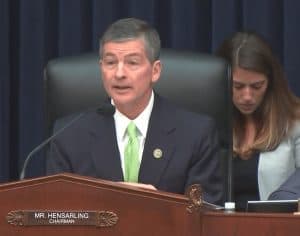 Congressman Jeb Hensarling, the Committee Chair, released a statement regarding the Hearing:
Congressman Jeb Hensarling, the Committee Chair, released a statement regarding the Hearing:
“This committee is extremely encouraged by the SEC’s renewed commitment, under your leadership, to facilitate capital formation to help small businesses access the capital they need to innovate, grow and provide economic opportunities for all Americans. We also appreciate the public comments you made on the need to reverse the trend of declining Initial Public Offerings.”
The Hearing is embedded below.

